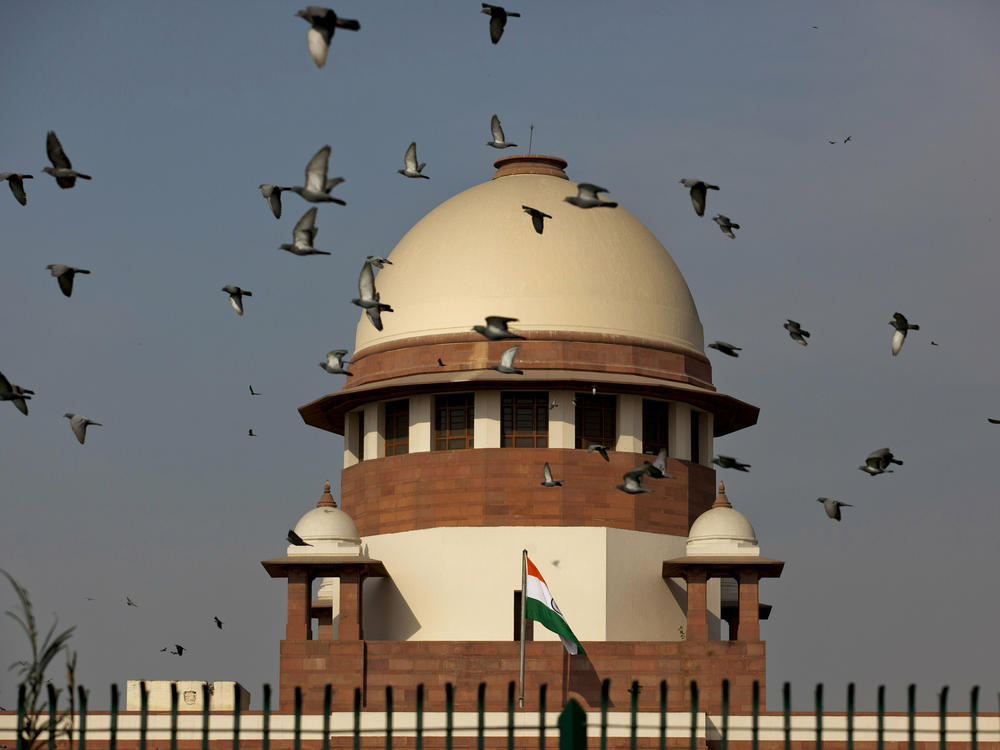Section Branding
Header Content
Will India legalize same-sex marriage? Its top court hears arguments this week
Primary Content
Updated April 18, 2023 at 10:14 AM ET
India's Supreme Court is hearing final arguments this week in a historic group of petitions to legalize same-sex marriage.
It's a consolidation of cases brought by several LGTBQ couples and opposed by the government of Prime Minister Narendra Modi.
"These petitions are basically asking that the right to marry a person of one's own choice should be extended to LGBTQ citizens as well," says freelance journalist Shalu Yadav, who's been watching the trial from New Delhi.
India's government put its LGBTQ population at 2.5 million in 2012, and more recent global estimates say it could be at least 10% of the country, or more than 135 million people.
The hearings are being livestreamed online in what the court calls the public interest. It's not clear when or how the five-judge panel will rule.
Notably, this same court granted certain rights to the transgender community in 2014, declared privacy a constitutional right in 2017, decriminalized gay sex in 2018 and expanded protections for "atypical" families in 2022.
A favorable decision in this case would make India the 35th country worldwide and the second place in Asia to allow marriage equality, after Taiwan's parliament passed such a bill in 2019.
And, as NPR has reported, it would also mean an overhaul of many Indian laws governing things like parenthood, inheritance, alimony and divorce.
Here's what else we know so far.
The plaintiffs want equal rights
The four couples serving as plaintiffs in the case argue they're being discriminated against by being denied the same legal rights as straight married couples.
It's been almost five years since the Supreme Court struck down a colonial-era ban on gay sex. Even so, the LGBTQ community still doesn't have equal rights when it comes to things like inheritance, divorce, property ownership and adoption.
"It's simple things ... like getting a joint bank account or health insurance or owning a house together, which cannot be done as a same sex couple because their union is not recognized in Indian law," Yadav tells Morning Edition.
For example, current Indian law only recognizes one member of a same-sex couple as a parent, either because they gave birth to their child or adopted them as a single parent.
Plaintiffs Aditi Anand and Susan Dias told NPR last month that they're taking up this fight because they do everything heterosexual couples do, but without legal security. And that includes raising their toddler.
"There is no reason that our child should be denied the right to two parents," Anand said.
The Indian Psychiatric Society, the country's largest organization of mental health professionals, issued a statement last week reiterating that homosexuality is not a disease and that denying people their civil rights may lead to mental health issues.
That declaration could be significant, the BBC notes: The Supreme Court's judgement decriminalizing gay sex referred to a statement of support from the same organization.
Government and religious groups are opposed
India's socially conservative government is against the legalization of same-sex marriage, and questions whether the court (as opposed to parliament) has the right to decide it at all.
Modi's position is that same-sex relationships can't be compared to the sacred Indian family concept of "a wife, a husband and children born out of the union," Yadav explains.
The government rejects the argument that marriage equality is a fundamental right, even writing in a recent filing that the "petitions merely reflect urban elitist views" — which has evoked strong reactions from the LGBTQ community and beyond. Hindu, Muslim, Jain, Sikh and Christian leaders have also joined together to oppose legalization, raising concerns about what it would mean for procreation and the "natural family order."
One Muslim body told the court that the concept of same-sex marriage would essentially "attack" the Indian family system, Yadav says.
"They say that if legalized, same-sex marriages will dilute the concept of marriage — which is a stable institution, as per them — and bring in a free-floating system that will be harmful, according to them, to the social order," she adds.
How we got here
Indian attitudes towards LGBTQ people have grown more tolerant in recent years.
The Pew Research Center found that 37% of Indian people said homosexuality should be accepted by society in 2019, a large jump from just 15% in 2014.
Yadav says that while conversations around LGBTQ rights have accelerated in the last decade or so, the country still has some distance to go.
"The attitudes have definitely changed on the ground, but we still hear about cases of attacks on same-sex couples and there's a general resistance to the idea of recognizing them in the institution of marriage," she adds.
Plaintiffs have tried to bring the issue of marriage equality before the country's top court since 2020.
Yadav says that last year a growing number of petitions to legalize same-sex marriage made their way to city courts and the Supreme Court, which decided to bundle them together into the case it's hearing now.
India isn't the only Asian country that could be moving — albeit slowly — towards marriage equality. The Human Rights Campaign says it's also "tracking developments" in Japan, Thailand and the Philippines.
Copyright 2023 NPR. To see more, visit https://www.npr.org.

